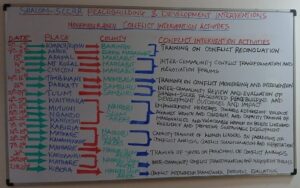
Peace-building workshop in Molo.
By Peterlinus Ouma
The wave of inter-ethnic conflicts in Molo, especially in 2007/2008, went down in Kenya’s history as the worst since independence. Molo is a town in Nakuru County in the heart of the Great Rift Valley with a population of 107,806. Molo is inhabited by several ethnic groups although the Agikuyu, the Kipsigis (a sub-group of the larger Kalenjin) and the Abagusii are the most populous. Since the introduction of multi-partysm in 1991, their political and cultural differences have been exploited by politicians; the result has been ethnic based violence that has led to much negative social, cultural and economic distortions and loss of life which are crying out for positive transformations and life saving interventions.
In this area, inter-ethnic conflicts between Kikuyu and Kisii; Kalenjin and Kikuyu; Kalenjin and Kisii are commonplace. Lying within the Rift-valley, Molo has been characterized by ethnic violence and ethnic cleansing, where ethnic groups (specifically Abagusii) were targeted for removal, ostensibly to be sent back to their “ancestral lands.”. Molo was one of the hard hit violence epicenters during the 2007/2008 post-election violence that was experienced in Kenya. To the present moment there still exists tensions amongst the various ethnic communities living in Molo, hence the strong need for initiating relationship building approaches.
Shalom’s profile of working amongst communities in conflict has led to the recognition, appreciation and continued need amongst communities in conflict. As a result, SCCRR were asked by local inhabitants living in Molo and the Catholic Justice and Peace Committee, to facilitate a workshop in Molo during the third week of May. The workshop was geared towards building the capacity of Local community and the Diocese Peace Committee members with skills to end the cycle of violence witnessed in Nakuru County. The theme of the workshop was on conflict early warning and early response, as key in conflict prevention.
The participants exhibited enthusiasm, and had very positive attitudes regarding knowledge imparted to them. They appreciated the content and requested Shalom to continue training them on various peace-building strategies. They acknowledged the unique approach that SCCRR uses to reach out to communities in conflict by equipping them with analytical skills in conflict management.

Participants in the Molo workshop.

